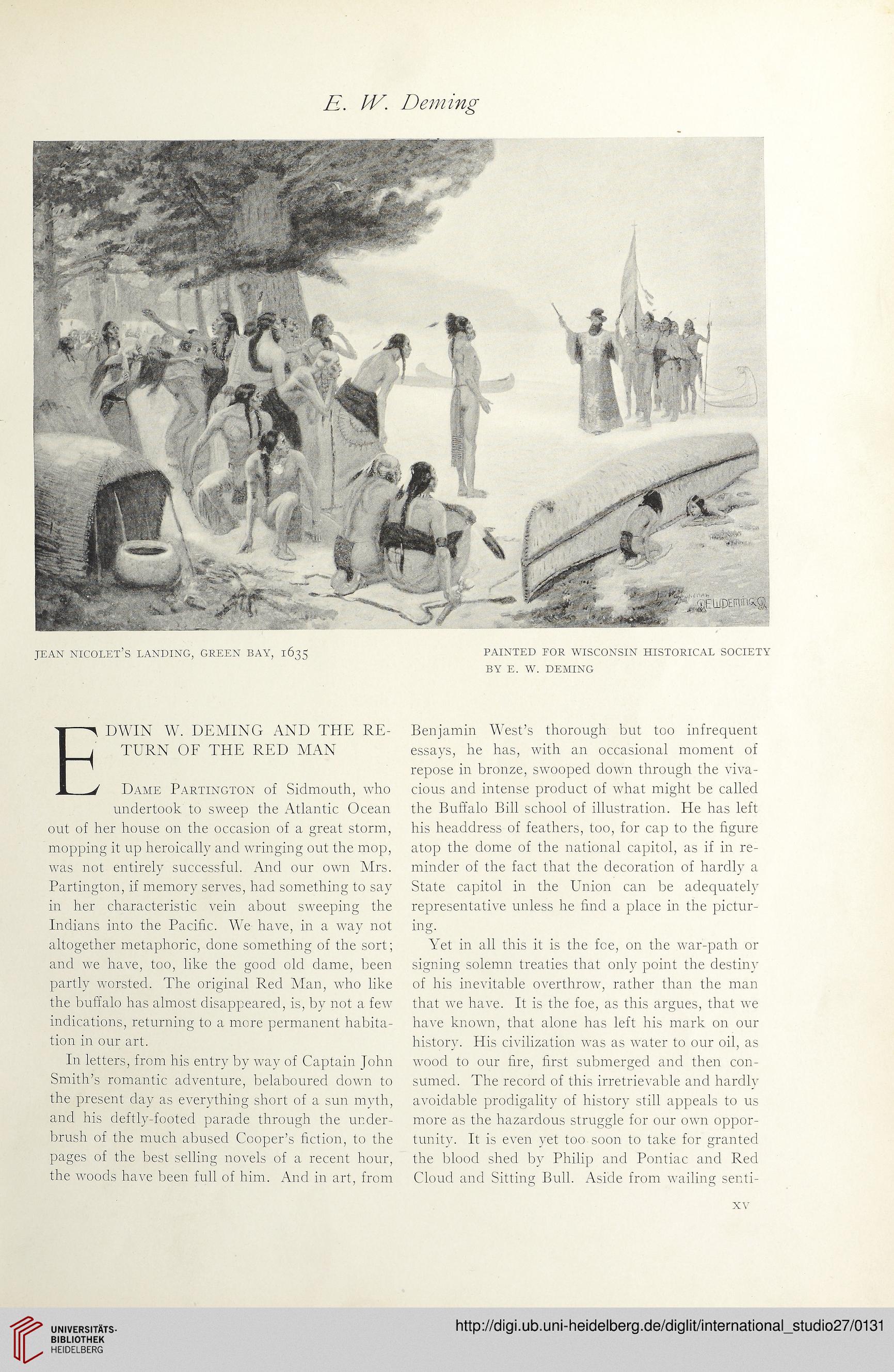E. IV. Deming
JEAN NICOLET’S LANDING, GREEN BAY, 1635
PAINXED EOR WISCONSIN PIISTORICAL SOCIETY
BY E. W. DEMING
E
DWIN W. DEMING AND THE RE-
TURN OF THE RED MAN
Dame Partington of Sidmouth, who
undertook to sweep the Atlantic Ocean
out of her house on the occasion of a great storm,
mopping it up heroically and wringing out the mop,
was not entirely successful. And our own Airs.
Partington, if memory serves, had something to say
in her characteristic vein about sweeping the
Indians into the Pacific. We have, in a way not
altogether metaphoric, done something of the sort;
and we have, too, like the good old dame, been
partly worsted. The original Red Man, who like
the buffalo has almost disappeared, is, by not a few
indications, returning to a more permanent habita-
tion in our art.
In letters, from his entry by way of Captain John
Smith’s romantic adventure, belaboured down to
the present day as everything short of a sun myth,
and his deftly-footed parade through the ur.der-
brush of the much abused Cooper’s fiction, to the
pages of the best selling novels of a recent hour,
the woods have been full of him. And in art, from
Benjamin West’s thorough but too infrequent
essays, he has, with an occasional moment of
repose in bronze, swooped down through the viva-
cious and intense product of what might be called
the Buffalo Bill school of illustration. He has left
his headdress of feathers, too, for cap to the figure
atop the dorne of the national capitol, as if in re-
minder of the fact that the decoration of hardly a
State capitol in the Union can be adequately
representative unless he find a place in the pictur-
ing.
Yet in all this it is the foe, on the Avar-path or
signing solemn treaties that only point the destiny
of his inevitable overthrow, rather than the man
that we have. It is the foe, as this argues, that Ave
have knoAvn, that alone has left his mark on our
history. His civilization Avas as Avater to our oil, as
avoocI to our fire, first submerged and then con-
sumed. The record of this irretrievable and hardly
avoidable prodigality of history still appeals to us
more as the hazardous struggle for our OAAm oppor-
tunity. It is even yet too soon to take for granted
the blood shed by Philip and Pontiac and Red
Cloucl and Sitting Bull. Asicle from wailing senti-
XA7
JEAN NICOLET’S LANDING, GREEN BAY, 1635
PAINXED EOR WISCONSIN PIISTORICAL SOCIETY
BY E. W. DEMING
E
DWIN W. DEMING AND THE RE-
TURN OF THE RED MAN
Dame Partington of Sidmouth, who
undertook to sweep the Atlantic Ocean
out of her house on the occasion of a great storm,
mopping it up heroically and wringing out the mop,
was not entirely successful. And our own Airs.
Partington, if memory serves, had something to say
in her characteristic vein about sweeping the
Indians into the Pacific. We have, in a way not
altogether metaphoric, done something of the sort;
and we have, too, like the good old dame, been
partly worsted. The original Red Man, who like
the buffalo has almost disappeared, is, by not a few
indications, returning to a more permanent habita-
tion in our art.
In letters, from his entry by way of Captain John
Smith’s romantic adventure, belaboured down to
the present day as everything short of a sun myth,
and his deftly-footed parade through the ur.der-
brush of the much abused Cooper’s fiction, to the
pages of the best selling novels of a recent hour,
the woods have been full of him. And in art, from
Benjamin West’s thorough but too infrequent
essays, he has, with an occasional moment of
repose in bronze, swooped down through the viva-
cious and intense product of what might be called
the Buffalo Bill school of illustration. He has left
his headdress of feathers, too, for cap to the figure
atop the dorne of the national capitol, as if in re-
minder of the fact that the decoration of hardly a
State capitol in the Union can be adequately
representative unless he find a place in the pictur-
ing.
Yet in all this it is the foe, on the Avar-path or
signing solemn treaties that only point the destiny
of his inevitable overthrow, rather than the man
that we have. It is the foe, as this argues, that Ave
have knoAvn, that alone has left his mark on our
history. His civilization Avas as Avater to our oil, as
avoocI to our fire, first submerged and then con-
sumed. The record of this irretrievable and hardly
avoidable prodigality of history still appeals to us
more as the hazardous struggle for our OAAm oppor-
tunity. It is even yet too soon to take for granted
the blood shed by Philip and Pontiac and Red
Cloucl and Sitting Bull. Asicle from wailing senti-
XA7




